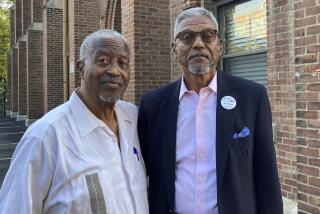Participants in ‘50s School Radiation Test Tell of Fears : Ethics: Former students at an institution for the retarded testify about possible lasting effects from a food experiment. Hearings may be stormy.
- Share via
WALTHAM, Mass. — Two former students at a Massachusetts school for the mentally retarded told federal lawmakers Thursday that their excitement over taking part in a 1950s school Science Club had turned to fear since they learned that club members were fed cereal laced with radioactivity.
The testimony of two subjects of radiation experiments marked a dramatic opening to what is expected to be a season of stormy congressional hearings on some three decades of human experimentation involving radiation.
His voice cracking, Austin LaRocque, a 47-year-old building superintendent who participated in a four-year series of experiments, told lawmakers that he feared the experiments could have lasting effects on him and on his three healthy children.
“If it was your son, would you have accepted it?” LaRocque, who is mildly retarded, demanded of Dr. A. Bertran Brill, director of nuclear medicine research at the University of Massachusetts Medical Center.
“Knowing what I know now, I would honestly say yes,” Brill told LaRocque. But “at that time, I don’t know,” he added.
Brill told the Senate hearing chaired by Sen. Edward M. Kennedy (D-Mass.) that the 1951-54 experiments at the Fernald State School for the mentally retarded here exposed subjects to extremely low doses of radiation. He defended the experiments as motivated by a desire to find out about childrens’ nutritional needs rather than to serve Cold War military goals.
After more than four decades of secrecy, the government’s use of human guinea pigs in radiation experiments after World War II has been revealed by Energy Secretary Hazel O’Leary.
Clinton Administration witnesses at Thursday’s hearing told lawmakers that they would turn over federal records of the experiments, but they cautioned that it probably would be time consuming to collect the records and that the information provided probably would be spotty.
Dr. Marty Albert, director of medical research services for the Department of Veterans Affairs, told lawmakers that “there’s a good chance a lot of those records are just plain lost.”
“We are very aware of the enormity of the task we confront,” added Dr. Tara O’Toole, the assistant energy secretary who is overseeing the gathering of documents. “This is going to be painful,” she said, but necessary to “do right” by the many subjects who were uninformed and sometimes misled by scientists whose studies were underwritten by the federal government.
In a letter sent to parents or guardians of experiment subjects, for instance, Fernald administrators said that the proposed study “will cause no discomfort or change in their physical condition, other than possible improvement.”
LaRocque and a fellow Fernald student, 49-year-old Charles Dyer, said that members of the Science Club were eager to participate because they were fed special food and taken on trips off the school’s campus. Dyer recalled that he was given a Mickey Mouse watch by researchers and invited to a party at the Massachusetts Institute of Technology, which conducted the experiments under federal sponsorship.
*
“They said it would benefit us by taking our vitamins and stuff. And I said, ‘Su” said Dyer, now a truck driver with two children. “They took advantage of us because we were young.”
Rep. Edward J. Markey (D-Mass.), who attended the hearing, said that Dyer and LaRocque had been “unwittingly drafted as foot soldiers in the Cold War.” Markey and Kennedy proposed legislation that would strengthen protection for human subjects in medical experiments.
Dr. J. David Litster, a physicist who is conducting a technical review of experiments by MIT researchers, said that the dose of radioactive iron administered at Fernald statistically would result in one additional cancer death in a population of 3,000.
But medical ethicists deplored the absence of the subjects’ informed consent and the choice of an institutionalized population of children for the experiments.
More to Read
Get the L.A. Times Politics newsletter
Deeply reported insights into legislation, politics and policy from Sacramento, Washington and beyond. In your inbox twice per week.
You may occasionally receive promotional content from the Los Angeles Times.









